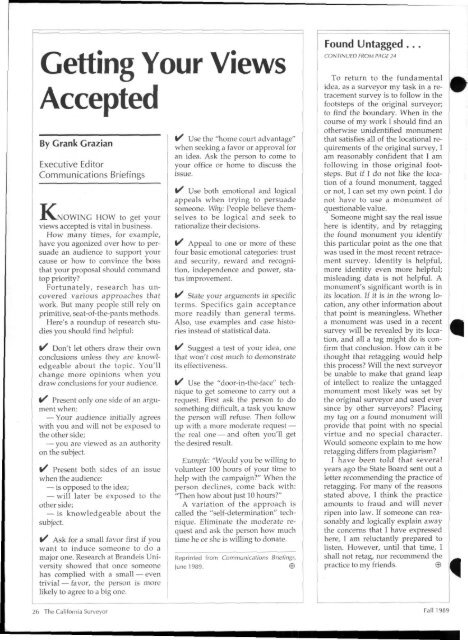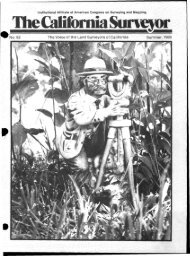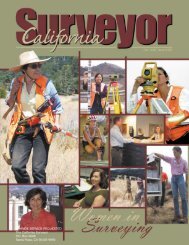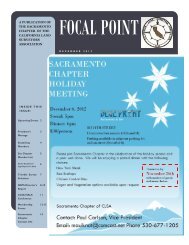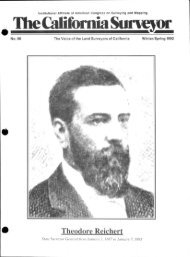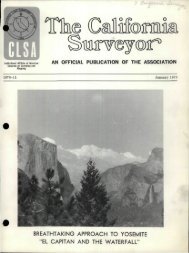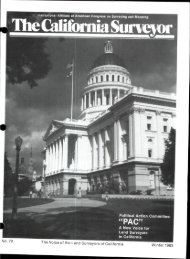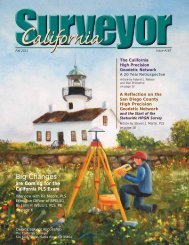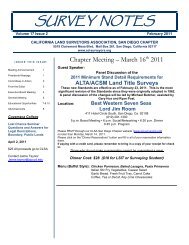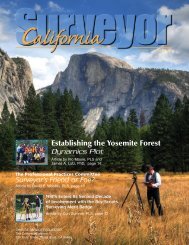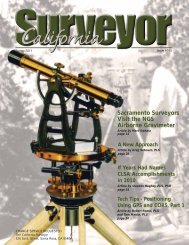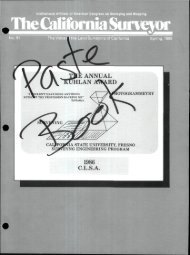Institutional Affiliate of American Congress on Surveying and - CLSA
Institutional Affiliate of American Congress on Surveying and - CLSA
Institutional Affiliate of American Congress on Surveying and - CLSA
Create successful ePaper yourself
Turn your PDF publications into a flip-book with our unique Google optimized e-Paper software.
Getting Your Views<br />
Accepted<br />
By Crank Grazian<br />
Executive Editor<br />
Communicati<strong>on</strong>s Briefings<br />
K<br />
.NOWING HOW to get your<br />
views accepted is vital in business.<br />
How many times, for example,<br />
have you ag<strong>on</strong>ized over how to persuade<br />
an audience to support your<br />
cause or how to c<strong>on</strong>vince the boss<br />
that your proposal should comm<strong>and</strong><br />
top priority?<br />
Fortunately, research has uncovered<br />
various approaches that<br />
work. But many people still rely <strong>on</strong><br />
primitive, seat-<str<strong>on</strong>g>of</str<strong>on</strong>g>-the-pants methods.<br />
Here's a roundup <str<strong>on</strong>g>of</str<strong>on</strong>g> research studies<br />
you should find helpful:<br />
|/ D<strong>on</strong>'t let others draw their own<br />
c<strong>on</strong>clusi<strong>on</strong>s unless they are knowledgeable<br />
about the topic. You'll<br />
change more opini<strong>on</strong>s when you<br />
draw c<strong>on</strong>clusi<strong>on</strong>s for your audience.<br />
•r Present <strong>on</strong>ly <strong>on</strong>e side <str<strong>on</strong>g>of</str<strong>on</strong>g> an argument<br />
when:<br />
— Your audience initially agrees<br />
with you <strong>and</strong> will not be exposed to<br />
the other side;<br />
— you are viewed as an authority<br />
<strong>on</strong> the subject.<br />
|/ Present both sides <str<strong>on</strong>g>of</str<strong>on</strong>g> an issue<br />
when the audience:<br />
— is opposed to the idea;<br />
— will later be exposed to the<br />
other side;<br />
— is knowledgeable about the<br />
subject.<br />
|/ Ask for a small favor first if you<br />
want to induce some<strong>on</strong>e to do a<br />
major <strong>on</strong>e. Research at Br<strong>and</strong>eis University<br />
showed that <strong>on</strong>ce some<strong>on</strong>e<br />
has complied with a small — even<br />
trivial — favor, the pers<strong>on</strong> is more<br />
likely to agree to a big <strong>on</strong>e.<br />
%/ Use the "home court advantage"<br />
when seeking a favor or approval for<br />
an idea. Ask the pers<strong>on</strong> to come to<br />
your <str<strong>on</strong>g>of</str<strong>on</strong>g>fice or home to discuss the<br />
issue.<br />
Ir Use both emoti<strong>on</strong>al <strong>and</strong> logical<br />
appeals when trying to persuade<br />
some<strong>on</strong>e. VWii/: People believe themselves<br />
to be logical <strong>and</strong> seek to<br />
rati<strong>on</strong>alize their decisi<strong>on</strong>s.<br />
%/ Appeal to <strong>on</strong>e or more <str<strong>on</strong>g>of</str<strong>on</strong>g> these<br />
four basic emoti<strong>on</strong>al categories: trust<br />
<strong>and</strong> security, reward <strong>and</strong> recogniti<strong>on</strong>,<br />
independence <strong>and</strong> power, status<br />
improvement.<br />
%/ State your arguments in specific<br />
terms. Specifics gain acceptance<br />
more readily than general terms.<br />
Also, use examples <strong>and</strong> case histories<br />
instead <str<strong>on</strong>g>of</str<strong>on</strong>g> statistical data.<br />
w Suggest a test <str<strong>on</strong>g>of</str<strong>on</strong>g> your idea, <strong>on</strong>e<br />
that w<strong>on</strong>'t cost much to dem<strong>on</strong>strate<br />
its effectiveness.<br />
w Use the "door-in-the-face" technique<br />
to get some<strong>on</strong>e to carry out a<br />
request. First ask the pers<strong>on</strong> to do<br />
something difficult, a task you know<br />
the pers<strong>on</strong> will refuse. Then follow<br />
up with a more moderate request —<br />
the real <strong>on</strong>e — <strong>and</strong> <str<strong>on</strong>g>of</str<strong>on</strong>g>ten you'll get<br />
the desired result.<br />
Example: "Would you be willing to<br />
volunteer 100 hours <str<strong>on</strong>g>of</str<strong>on</strong>g> your time to<br />
help with the campaign?" When the<br />
pers<strong>on</strong> declines, come back with:<br />
"Then how about just 10 hours?"<br />
A variati<strong>on</strong> <str<strong>on</strong>g>of</str<strong>on</strong>g> the approach is<br />
called the "self-determinati<strong>on</strong>" technique.<br />
Eliminate the moderate request<br />
<strong>and</strong> ask the pers<strong>on</strong> how much<br />
time he or she is wilhng to d<strong>on</strong>ate.<br />
Reprinted from Communicati<strong>on</strong>s<br />
Briefings,<br />
)une1989. ©<br />
Found Untagged<br />
CONTINUED FROM PAGE 24<br />
To return to the fundamental<br />
idea, as a surveyor my task in a retracement<br />
survey is to follow in the<br />
footsteps <str<strong>on</strong>g>of</str<strong>on</strong>g> the original surveyor;<br />
to find the boundary. When in the<br />
course <str<strong>on</strong>g>of</str<strong>on</strong>g> my work 1 should find an<br />
otherwise unidentified m<strong>on</strong>ument<br />
that satisfies all <str<strong>on</strong>g>of</str<strong>on</strong>g> the locati<strong>on</strong>al requirements<br />
<str<strong>on</strong>g>of</str<strong>on</strong>g> the original survey, I<br />
am reas<strong>on</strong>ably c<strong>on</strong>fident that 1 am<br />
following in those original footsteps.<br />
But if I do not like the locati<strong>on</strong><br />
<str<strong>on</strong>g>of</str<strong>on</strong>g> a found m<strong>on</strong>ument, tagged<br />
or not, I can set my own point. 1 do<br />
not have to use a m<strong>on</strong>ument <str<strong>on</strong>g>of</str<strong>on</strong>g><br />
questi<strong>on</strong>able value.<br />
Some<strong>on</strong>e might say the real issue<br />
here is identity, <strong>and</strong> by retagging<br />
the found m<strong>on</strong>ument you identify<br />
this particular point as the <strong>on</strong>e that<br />
was used in the most recent retracement<br />
survey. Identity is helpful,<br />
more identity even more helpful;<br />
misleading data is not helpful. A<br />
m<strong>on</strong>ument's significant worth is in<br />
its locati<strong>on</strong>. If it is in the wr<strong>on</strong>g locati<strong>on</strong>,<br />
any other informati<strong>on</strong> about<br />
that point is meaningless. Whether<br />
a m<strong>on</strong>ument was used in a recent<br />
survey will be revealed by its locati<strong>on</strong>,<br />
<strong>and</strong> all a tag might do is c<strong>on</strong>firm<br />
that c<strong>on</strong>clusi<strong>on</strong>. How can it be<br />
thought that retagging would help<br />
this process? Will the next surveyor<br />
be unable to make that gr<strong>and</strong> leap<br />
<str<strong>on</strong>g>of</str<strong>on</strong>g> intellect to realize the untagged<br />
m<strong>on</strong>ument most likely was set by<br />
the original surveyor <strong>and</strong> used ever<br />
since by other surveyors? Placing<br />
my tag <strong>on</strong> a found m<strong>on</strong>ument will<br />
provide that point with no special<br />
virtue <strong>and</strong> no special character.<br />
Would some<strong>on</strong>e explain to me how<br />
retagging differs from plagiarism?<br />
I have been told that several<br />
years ago the State Board sent out a<br />
letter recommending the practice <str<strong>on</strong>g>of</str<strong>on</strong>g><br />
retagging. For many <str<strong>on</strong>g>of</str<strong>on</strong>g> the reas<strong>on</strong>s<br />
stated above, 1 think the practice<br />
amounts to fraud <strong>and</strong> will never<br />
ripen into law. If some<strong>on</strong>e can reas<strong>on</strong>ably<br />
<strong>and</strong> logically explain away<br />
the c<strong>on</strong>cerns that I have expressed<br />
here, 1 am reluctantly prepared to<br />
listen. However, until that time, I<br />
shall not retag, nor recommend the<br />
practice to my friends. ®<br />
26 The California Surveyor Fall 1989


